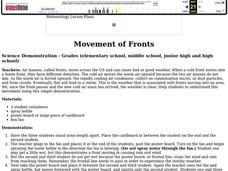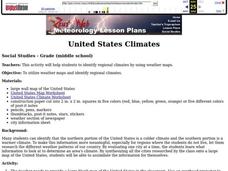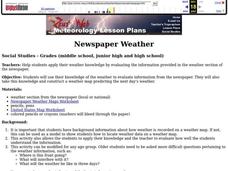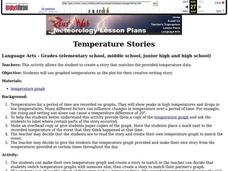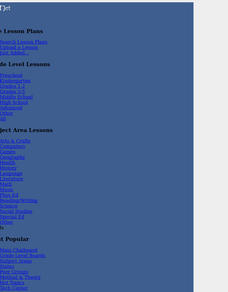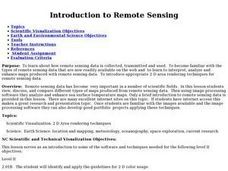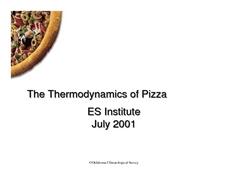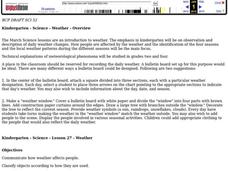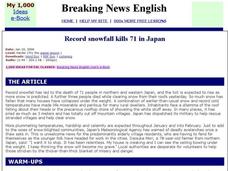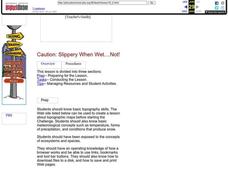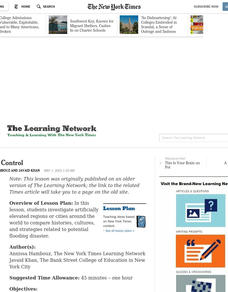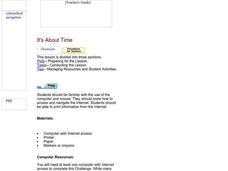Curated OER
Winds Over Land vs. Ocean
Students explore friction and the way it impacts wind over the ocean compared to over land.
Curated OER
Bicycle Pump Pressure
Students explain that air pressure applies a force. If any of students have flown in an airplane, they have felt the "popping" of their ears caused by the change in atmospheric pressure because of the altitude changes.
Curated OER
Movement of Fronts
Students use a demonstration in order to learn abou the movement of weather fronts.
Curated OER
Lightning Safety
Students investigate how lightning is produced and ways they can keep themselves safe during a lightning storm. After a lecture/demo, students use a worksheet imbedded in this plan to reinforce the concepts taught.
Curated OER
United States Climates
Learners identify regional climates by using weather maps. They, in groups, locate and mark their city on the small map, then go to the larger map to locate and mark their city when they are called upon by teacher.
Curated OER
Newspaper Weather
Students use their knowledge of the weather to evaluate information from the newspaper. They also take this knowledge and construct a weather map predicting the next day's weather.
Curated OER
Temperature Stories
Students create a story that matches the provided temperature data. They use graphed temperatures as the plot for their creative writing story.
Curated OER
Weather Journal
Sixth graders write in a journal using weather observations as the focus, they develop writing techniques in addition to scientific observation skills.
Curated OER
Clouds
Students study how to use the Internet as a static information collection tool, to enhance the literature stories on the weather and study how to use the calculator.
Curated OER
Introduction to Remote Sensing
Students view, discuss, and compare different types of maps produced from remote sensing data. They use image processing software to analyze and enhance sea surface temperature maps.
Curated OER
Water: On the Surface and in the Ground
Learners explore the differences between surface water and ground water. They collect data using maps and graphs and investigate a Texas river basin and a nearby aquifer. They complete a written report including maps and data regarding...
Curated OER
Student Weather Journal
Students recognize different types of cloud patterns and associate these patterns with certain types of weather. They predict the weather for the next 6 to 24 hours. They then improve their observation skills as they check on the weather...
Curated OER
The Thermodynamics of Pizza
Students investigate the laws of thermodynamics. They observe demonstrations of each law, read a summary, and analyze how pizza demonstrates the laws of thermodynamics.
Curated OER
The Nebraska Brochure
Learners research the physical attributes of Nebraska. They work together to create a brochure highlighting the topic of their choice. They share their brochure to the class.
Curated OER
Cloud Observations using GLOBE Protocols
Students observe which of ten types of clouds are visible and how much of the sky is cloud covered. They see that by observing clouds, we can get information about temperature, moisture, and wind conditions in different places in the...
Curated OER
Using the Synoptic Code for the Prediction of Weather
Students interpret the synoptic code. They construct a thermoscreen with an anemometer. Students identify different types of clouds and understand and read barometric pressure. Students predict weather pattern as they apply to fronts.
Curated OER
Introduction to Severe Weather Patterns
Students review basic weather concepts and terminology, and explore weather modeling tools.
Curated OER
Weather
Students communicate how weather affects people, classify objects according to how they are used, and observe and record weather data using symbols.
Curated OER
DEW POINT
Fourth graders investigate conditions causing saturation and measure the dew point of the atmosphere performing simple experiments.
Curated OER
Breaking News English: snow
In this snow worksheet, students read the article, answer true and false questions, complete synonym matching, complete phrase matching, complete a gap fill, answer short answer questions, answer discussion questions, write, and more...
Curated OER
Breaking News English: Smog
In this smog worksheet, students read the article, answer true and false questions, complete synonym matching, complete phrase matching, complete a gap fill, answer short answer questions, answer discussion questions, write, and more...
Curated OER
Caution: Slippery When Wet....Not!
Students and manipulate data from Internet sites to design a downhill ski course that meets the International Federation of Skiing's requirements for a safe and fair competition.
Curated OER
Damage Control
Students investigate artificially elevated regions or cities around the world to compare histories, cultures, and strategies related to potential flooding disaster.
Curated OER
It's About Time: Olympics, Winter Sports, Math, Media, Time Zones
Students use the Internet to determine broadcast times for the Winter Olympic Games snowboarding competitions. In determining these times, they need to consider time zones throughout the world.




